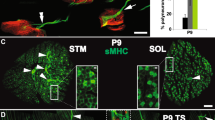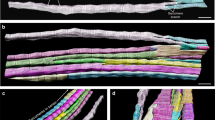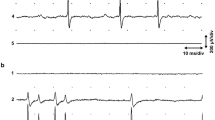Abstract
MUSCLE activity has been shown to be a central factor in controlling the level of extrajunctional acetylcholine receptors (AChR): inactivity of muscle fibres causes an increase in the number of AChR and electrically stimulated activity causes a decrease. We investigated the mechanism by which this activity regulates the level of AChR in muscle fibres that have differentiated in cell culture. Our results suggest that electrical stimulation decreases the AChR level by decreasing the synthesis of the receptors rather than by degrading or inactivating them.
This is a preview of subscription content, access via your institution
Access options
Subscribe to this journal
Receive 51 print issues and online access
$199.00 per year
only $3.90 per issue
Buy this article
- Purchase on Springer Link
- Instant access to full article PDF
Prices may be subject to local taxes which are calculated during checkout
Similar content being viewed by others
References
Axelsson, J. and Thesslef, S. J. Physiol., Lond., 147, 178–193 (1959).
Lomo, T. and Rosenthal, J. J. Physiol., Lond., 221, 493–513 (1972).
Drachman, D. B. and Witzke, F. Science, 176, 514–516 (1972).
Purves, D. and Sakmann, B. J. Physiol., Lond., 237, 157–182 (1974).
Hogan, P. G., Marshall, J. M. and Hall, Z. W. Nature, 261, 328–330 (1976).
Jones, R. and Verbova, G. J. Physiol., Lond., 236, 517–538 (1974).
Lomo, T. and Westgaard, R. H. J. Physiol., Lond., 252, 603–626 (1975).
Vogel, Z., Sytkowski, A. J. and Nirenberg, M. W. Proc. natn. Acad. Sci. U.S.A., 69, 3180–3184 (1972).
Cohen, S. A., Fischbach, G. D. Science, 181, 76–78 (1973).
Shainberg, A., Cohen, S. A. and Nelson, P. G. Pflügers Arch. Eur. J. Physiol., 361, 255–261 (1976).
Berg, D. K. and Hall, Z. W. J. Physiol., Lond., 252, 779–790 (1975).
Chang, C. C. and Huang, M. C. Nature, 253, 643–644 (1975).
Devreotes, P. N. and Fambrough, D. M. J. Cell Biol, 65, 335–358 (1975).
Walker, C. R. and Wilson, B. W. Nature, 256, 215–216 (1975).
Shainberg, A., Yagil, G. and Yaffe, D. Devl Biol., 25, 1–29 (1971).
Lavoie, P. A., Collier, B. and Tenenhouse, A. Nature, 260, 349–350 (1976).
Pestronk, A., Drachman, D. B. and Griffin, J. W. Nature, 260, 352–353 (1976).
Author information
Authors and Affiliations
Rights and permissions
About this article
Cite this article
SHAINBERG, A., BURSTEIN, M. Decrease of acetylcholine receptor synthesis in muscle cultures by electrical stimulation. Nature 264, 368–369 (1976). https://doi.org/10.1038/264368a0
Received:
Accepted:
Issue Date:
DOI: https://doi.org/10.1038/264368a0
This article is cited by
-
Weak electromagnetic fields alter Ca2+ handling and protect against hypoxia-mediated damage in primary newborn rat myotube cultures
Pflügers Archiv - European Journal of Physiology (2016)
-
Differentiation of myoblasts and CNS cells grown either separately or as co-cultures on microcarriers
Cytotechnology (1992)
-
Calcium and ionophore A23187 stimulates deposition of extracellular matrix and acetylcholinesterase release in cultured myotubes
Cell and Tissue Research (1991)
-
Activity-dependent regulation of gene expression in muscle and neuronal cells
Molecular Neurobiology (1989)
-
Regulation of acetylcholine receptor density in membranes of denervated mouse muscles
Pfl�gers Archiv European Journal of Physiology (1983)
Comments
By submitting a comment you agree to abide by our Terms and Community Guidelines. If you find something abusive or that does not comply with our terms or guidelines please flag it as inappropriate.



